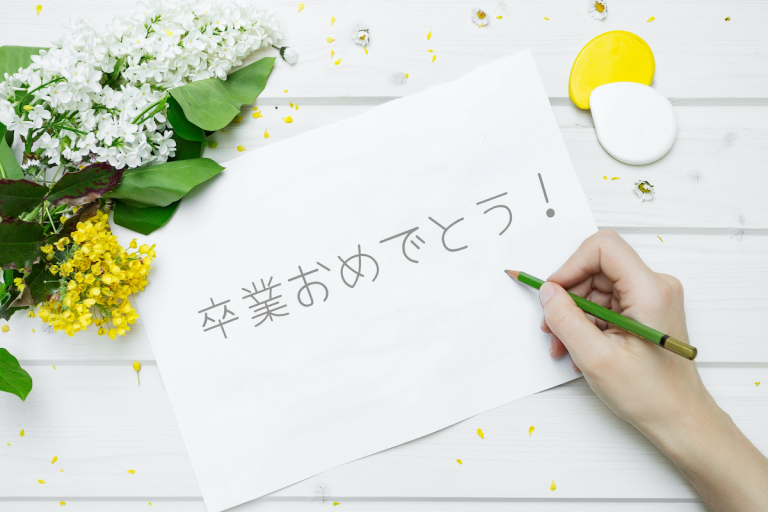
Graduation is the most bittersweet event in the school calendar. Winter fades with the end of the school year and the fresh sakura starts to blossom. Now is the time teachers wish their graduating students’ good luck in their next adventure.
But what is the best advice for your students? How do you choose what to write in Japanese yearbooks?
Graduation (卒業)
Graduation ceremonies are typically held mid-March. This is the time to say a final good bye to elementary school 6th graders and 3rd graders in junior high school and high schools.
The ceremony is usually held in the school gym. Each student receives their diploma on stage in front of their teachers and parents. The Head of year and principal will give also speech. There is a lot of clapping. And a little crying.
You should try and make time to speak with students and parents after the ceremony. This is an excellent opportunity to wish them well and good luck for the future.
Graduation Congratulation Message
As a teacher, you may be asked to write a graduation congratulations message. This may be for the student’s yearbooks or as part of a message board display.
Depending on your Japanese level, this may be a tricky task. If you choose to stick with English, keep your message short and easy to understand. Some simple words of encouragement can be enough to maintain their motivation.
For example, my students loved the phrase ‘perfect harmony’ from their English textbook. They used it as part of their school trip motto. I incorporated the phrase with simple English in a motivational poster design:

If you can, try adding a little Japanese to your message. This will help establish a connection with lower-ability students.
Pick a memorable quote
Not good with words? Don’t worry. You can select your favorite inspirational quote to inspire students. This may come from a movie, book or a respected person. Here are a few examples:
“Do, or do not. There is no “try” – Yoda, Star Wars
“Great men are not born great, they grow great.” – Mario Puzo, The Godfather
“With great power comes great responsibility. ” – Spider Man
“Your identity is your most valuable possession. Protect it.” — Elastigirl (The Incredibles)
Using a movie quote is a good way to end your final lesson with students. This is an opportunity for you to be a little less formal before the final ceremony. Choose an easy-to-understand quote to wish them luck before their big day.
Tell them your Life Motto
Alternatively, you could pass on your choice proverb that has helped you in the past.
For example:
- Actions speak louder than words
- Always put your best foot forward
- Practise makes perfect
Most proverbs have a similar meaning or equal proverb in Japanese. Such as:
- ‘Never give up!’ = ‘Fall seven times. Stand up eight.’ (七転び八起き)
- ‘Everyone makes mistakes’ = ‘Even monkeys fall from trees’. (さるも き から おちる)
H2: Useful Farewell phrases
Still unsure? Below is a list of helpful congratulations messages in Japanese:
| 卒業おめでとうございます! | Congratulations on your Graduation! |
| ご多幸をお祈りします! | Good luck! |
| やり遂げたね! | You did it! |
| これからも笑顔で頑張って。 | Keep smiling and do your best. |
| 体に気を付けて頑張ってください | Take care and good luck! |
Avoid unlucky words
Graduation can be a somber event for some. Try to keep things positive and refrain from any unlucky, or taboo words (忌み言葉).
| 死や不幸 | Death / misfortune | 死ぬ、悲しむ、枯れる、苦しむ |
| 離別 | Separation | 別れる、飽きる, 切る、去る, 帰る |
| 重ね重ね / 度々 | Frequently, or repeatedly | 再び, 重ねて, もう一度, 再三、次々 |
Prepare for your last lessons with students
It’s important to consider the impact of graduating on your students. They will be leaving friends, teachers and their school behind. They may feel nervous about their next steps. You may see a mix of withdrawn or erratic behavior in the final weeks.
Students may lack focus and need a bit of relief from complex grammar points. Be sure to allocate time for fun activities. A good way end on a high note is to ask them to write about their best memories at the school. You can bring in any photos or videos from past events and share memories together.
How to emotionally prepare yourself
Whether you have been teaching for a year or decades, saying goodbye to students can be hard. No doubt you will have built relationships with at least a few of them. Wishing them a final farewell may also bring up some feelings of your own.
Take time to process how you feel. Practice gratitude for the good memories. Accept that seeing students leave is part of being a teacher. You may start feeling excited (or nervous!) to meet next year’s new students.
I have seen many teachers shed a tear (or many!) on Graduation day. Don’t be afraid to let a little emotion show. Talking with teachers can also help. They may be feeling the same as you.
We hope this article helps you offer some wise words to the next generation of students. If you are interested in teaching jobs in Japan, be sure to see our latest positions available. For more advice about teaching, please see our other working in Japan articles here.
Article Author: Beth Lawson














